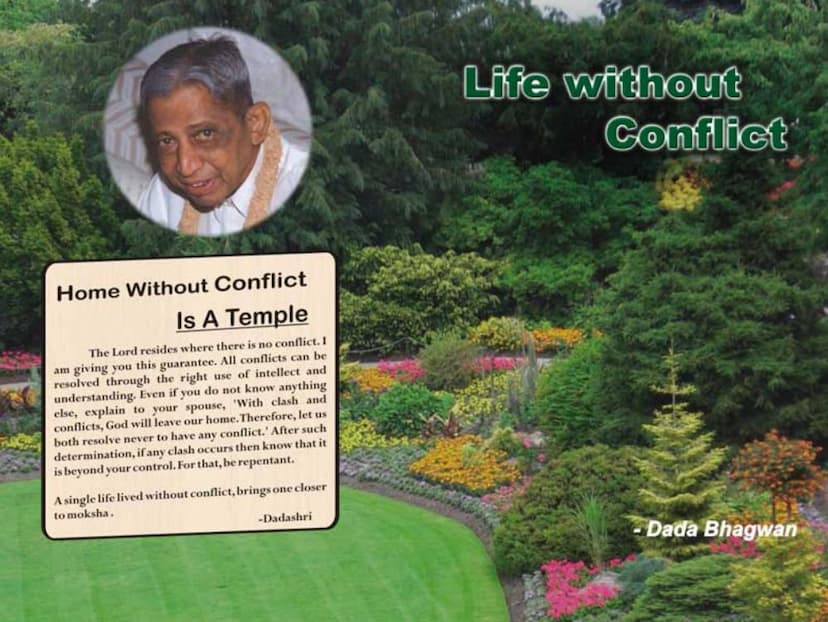Life Without Conflict
Added to library: September 2, 2025

Summary
Here's a comprehensive summary of "Life without Conflict" by Dada Bhagwan, based on the provided text:
Core Message:
The central theme of "Life without Conflict" is the profound teaching that a life free from conflict is not only possible but is the direct path to spiritual liberation (moksha). Dada Bhagwan, through his teachings, emphasizes that all suffering and conflict stem from misunderstanding and the false identification with the non-self (the body and mind), rather than the true Self (the Soul). The book provides practical guidance on navigating worldly life with harmony, peace, and spiritual awareness.
Key Principles and Concepts:
- The Goal of Life: The ultimate goal of human life is liberation from the cycle of birth and death. However, if liberation is not the immediate pursuit, then at least strive for a life free from conflict.
- Conflict Arises from Misunderstanding: All suffering and conflicts are rooted in incorrect understanding and a mistaken sense of "I am the doer."
- The Self (Soul) vs. The Non-Self: Dada Bhagwan distinguishes between the true Self (the Soul), which is pure and eternal, and the non-self (body, mind, intellect, ego), which is temporary and the source of suffering. True living involves remaining aware of the Self while engaging in worldly activities.
- Vyavasthit (Nature's Law/Circumstantial Evidence): Everything that happens is governed by a precise scientific order of cause and effect, known as Vyavasthit. Understanding this law helps in accepting events as they unfold, reducing blame and conflict.
- Pratikraman (The Art of Apology and Forgiveness): This is a crucial practice where one recalls mistakes, sincerely apologizes for them, and vows not to repeat them. Pratikraman helps clear karmic accounts and dissolve conflicts.
- Adjust Everywhere: This is a fundamental principle for resolving conflicts. It means adapting to situations and people's nature without insistence or ego, rather than trying to change them.
- Non-Violence (Ahimsa): True non-violence extends to thoughts, speech, and actions. Intending to hurt no living being, even minimally, is paramount.
- Benevolence: Living for the benefit of others, like trees that offer their fruits, creates merit karma and contributes to spiritual progress.
- Understanding Prakruti (Nature): Recognizing that everyone has a unique nature (prakruti) and adjusting one's interactions accordingly is key to harmony.
- The Role of the Gnani Purush: A Gnani Purush (Self-realized Master) is essential for imparting the knowledge of the Self and guiding individuals towards liberation and conflict-free living. The teachings are transmitted through a direct scientific process.
- Detachment from Worldly Relationships: While fulfilling worldly duties, it's important to maintain inner detachment from relationships, viewing them as temporary and governed by karma, rather than as inherently real.
- The Power of Inner Intent: A pure and firm inner intent to cause no harm and to live without conflict is more powerful than outward actions.
Practical Advice for a Conflict-Free Life:
- In Homes and Relationships:
- Husband-Wife: Avoid quarrels, speak with love and understanding, adjust to each other's prakruti, and see each other as partners, not adversaries. Understand that differences are inevitable in this era and require adjustment.
- Parents and Children: Guide children with love, avoid meddling, and understand that children are influenced by their parents' behavior. Treat children with care, like "glass." Improve yourself first, and children will follow.
- Family as a Whole: Create a peaceful home environment where God (Dada Bhagwan within) can reside. Avoid unnecessary interference and focus on fulfilling your role without attachment or aversion.
- In Business and Work:
- Be honest and principled.
- Maintain pure intentions to pay off debts.
- Do not worry excessively about gains or losses; they are part of Vyavasthit.
- Treat subordinates with kindness and respect; they are human beings with their own struggles.
- Avoid exploiting others or engaging in dishonest practices, as this leads to greater suffering.
- Dealing with Others:
- "Avoid conflicts" is a fundamental command.
- When faced with difficult people or situations, do not retaliate but find solutions through understanding and adjustment.
- Do not provoke reactions or engage in unnecessary arguments.
- Silence can be a powerful tool when words might escalate conflict.
- Take responsibility for your own suffering (the fault lies with the sufferer).
- Do not try to "fix" or "improve" others; focus on improving yourself.
- Attitude Towards Life:
- Embrace equanimity in all situations, recognizing that everything is governed by Vyavasthit.
- Cultivate a sense of gratitude for basic necessities.
- Avoid excessive materialism and unnecessary desires, as they lead to suffering.
- Live in the present moment, without excessive attachment to the past or anxiety about the future.
- Maintain inner peace and freedom, even amidst worldly chaos.
The "Akram Vignan" Path:
The book introduces "Akram Vignan," a direct, step-less path to Self-Realization, as taught by Dada Bhagwan. This path bypasses the arduous traditional methods and allows seekers to attain the knowledge of the Self within a short period through the grace of a Gnani Purush. The ultimate aim is to realize one's true nature as the Soul, leading to a life of unwavering peace and freedom from all conflicts.
In essence, "Life without Conflict" is a practical spiritual guide that empowers individuals to transform their lives by understanding the root causes of conflict and adopting principles of adjustment, benevolence, and self-awareness, ultimately leading to inner peace and liberation.